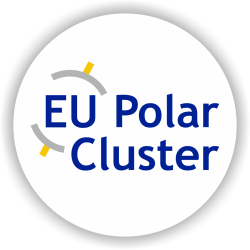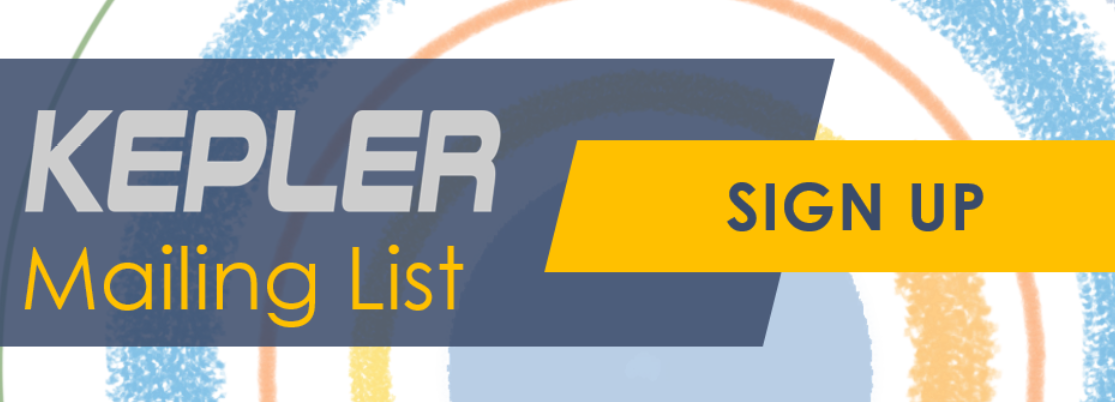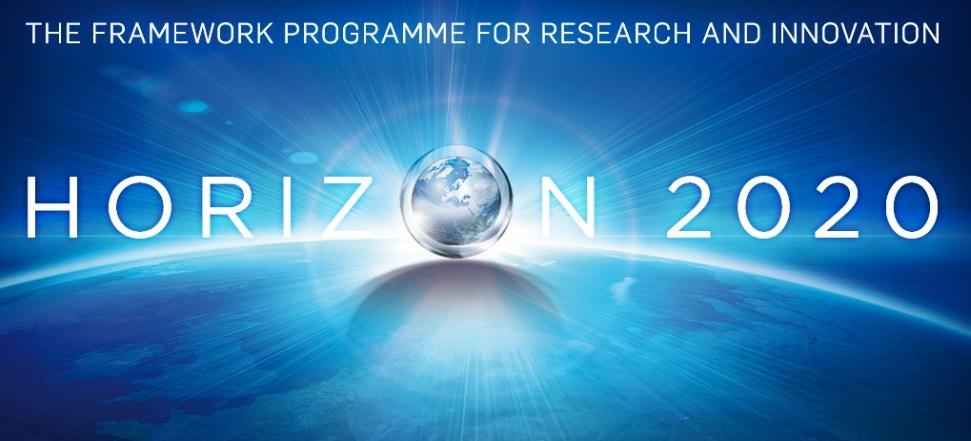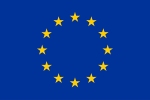Arctic Stakeholder Map
The KEPLER Interactive Stakeholder Map is an exploratory application, developed during the KEPLER project. The map provides an overview of Arctic activities and linkages to the European Union’s Copernicus programme.
The platform is now live, check it out at map.kepler-polar.eu – a direct link is also available via the menu above.
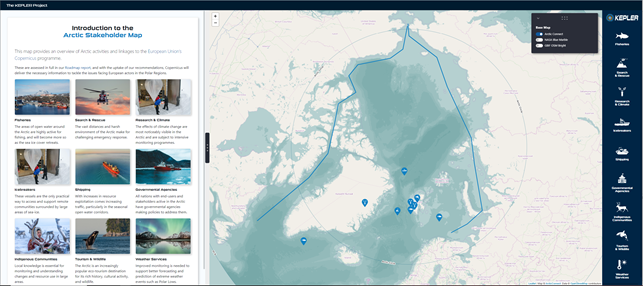
The Arctic Stakeholder Map database contains stakeholder interests from KEPLER, Copernicus and other relevant data streams*. The development of an Application Programming Interface allows users to access and display data in a visual map format, and view links to direct data sources for a more in-depth search.
*i.e. Fisheries, Search and Rescue, Research and Climate, Arctic shipping- including Icebreaker vessels, Government Agencies, Indigenous Communities, Tourism/Wildlife and Operational Weather Services.
Development and input of the map is ongoing, administrators continue to modify and add new items, external resources and CSV data. We hope that this map will be a legacy of the KEPLER project and plan for this platform to be utilised through other projects such as Arctic PASSION, and maintained by the EU Polar Cluster.
Further information about Arctic activities and linkages to the EU Copernicus programme can be found in the KEPLER Roadmap. The recommendations within the KEPLER roadmap aim inform the next phase of the Copernicus programme, aiming to improve information services, and tackle the issues facing users in polar regions.
We would love to hear your feedback about this new platform- you can get in touch via the contact button on the menu above.
KEPLER Video
As the KEPLER project wraps up, we have produced a video to highlight how KEPLER’s recommendations can inform the next phase of the Copernicus programme, aiming to improve information services for users in polar regions.
The full length version of the KEPLER video is now available to view and download here:
KEPLER Conclusions
After 2½ years investigation into end user and stakeholder information requirements for the Polar Regions, the KEPLER project has now reached its conclusions on how Copernicus should proceed during the period 2022-28. This includes an end-to-end operational system Roadmap based on a comprehensive review of the user requirements, current planning, and analysis of the existing research and capacity gaps.
Key findings from KEPLER are that existing, long-held, user requirements have not been appropriately addressed, and that there is scope for future improvement to intensify user uptake. These improvements could be delivered with new satellite Earth Observing capabilities, such as the Copernicus Expansion Missions, coming online in the later half of the decade.
There is a requirement for greater inclusion and support for in situ monitoring efforts, including Citizen Science initiatives. This would provide a greater sense of ‘ownership’ of Copernicus by European citizens. Greater focus must also be placed on utilising the many resources, both inside and outside of Copernicus, to provide stronger oversight and quality assurance of data products and information. By doing so, Copernicus will ensure that these products are relevant and fit-for-purpose, informing decisions both today and in the future. This will promote the accelerated uptake of new research and technological developments coming out of Horizon Europe. Additionally, KEPLER identified that terminologies within Copernicus differ from internationally accepted practise, which can cause confusion and impede users from effectively communicating their requirements.
The Roadmap addresses the above mentioned challenges, moving us towards a comprehensive European end-to-end operational system, by improving design aspects such as the set of required observations, and the potential inclusion of prior information to better constrain sparsely observed areas/variables. It suggests strategies to close gaps in our current forecasting capabilities, and ways to develop and sustain the observing system.
With the uptake of our recommendations, as described in full in our Roadmap report, KEPLER is confident that the Copernicus monitoring system for Earth will deliver the necessary information to tackle the issues facing European actors in the Polar Regions. This includes in-situ and satellite components, data handling capabilities, forecast and reanalysis modelling systems, and dissemination procedures. Copernicus support will meet the varied needs of climate change monitoring and prediction, waste/pollution management, and safe and efficient navigation in ice infested waters, and facilitate the shift towards a low carbon economy. The roadmap towards a European end-to-end operational system addresses the design aspects and recommends strategies to close gaps in our current capabilities, along with ways to evolve and sustain the observing system.
Keep an eye on our website and social media, where we will post a recap on KEPLER’s key reports and project highlights over the next few weeks. We also plan to disseminate results at events and conferences in upcoming months. For access to all project deliverables, reports, training sessions and more, click the button below to check out our resources page…
KEPLER Final Review
The Final Review Meeting for KEPLER was held on Tuesday 13 July 09:00-13:00 BST
The KEPLER Management Board (KMB) presented project results to the European Commission and the external reviewer.
The KEPLER team were thrilled to receive a positive assessment of the project output, and have finalised the actions based on project review results, and we have submitted a reply to the Commission.
We wish to thank all participants in the project, both project members and those that have input to workshops and questionnaires and all other activities – we’re grateful for your efforts, which have contributed to the deliverables and milestones, and a successful review.
In particular we wish to thank the WP leaders for pulling all the work together, in the deliverables, the dissemination outputs (see resources tab), and the draft periodic review report.
Special thanks go to the Reviewer, and our two project officers from the EC, and colleagues from DG Grow, who have all read through the reports and outputs, and given input and support.
We are now working on the final reporting requirements for the EC over the rest of the summer. We won’t be leaving things there though, we hope to continue to disseminate our results over the coming months at events and conferences.
We will also continue the legacy of KEPLER and collaborations and networks built, through the EU Polar Cluster.
KEPLER Video
Sámi subtitled version:

